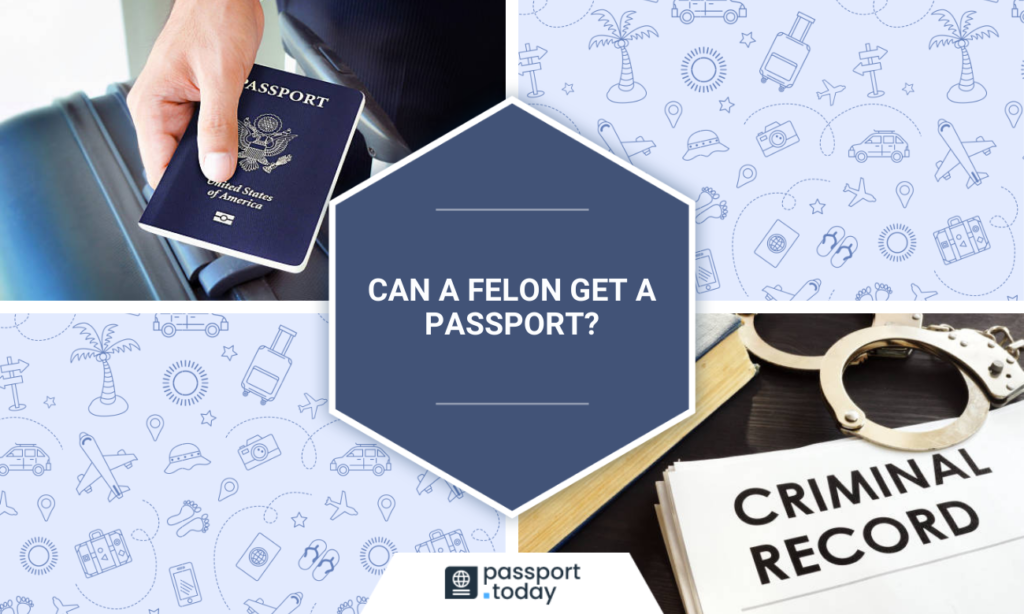All the rules and regulations, exceptions and special cases can make obtaining a passport a confusing topic for any person. Once the eligibility requirements are made clear, however, a U.S. citizen can easily get a passport. For a felon, it may be more complex.
The first and most important question to emerge in this predicament is: “Can a felon get a passport?” Typically speaking, the answer is yes. Nevertheless, there are some cases in which this is untrue or semi-true.

Can a convicted felon get a passport?
Yes. In most circumstances, convicted felons and ex-felons are able to get a passport.
Keep in mind though, that a passport is a document used for reasons of identification, primarily, as well as to be allowed to enter the United States, after finishing travels abroad. Taking this into account, even with a passport in possession, the felon may still not be able to travel everywhere.
So, if plans to travel abroad, or any other reason for wanting a passport are in your immediate future, we recommend you carefully examine below the eligibility of the felon getting a passport. There are 2 (two) main exceptions to the initial statement, reasons as to why a felon may be disqualified from the possession of a valid passport. Specifically:
- if the U.S. State Department denies/cancels or confiscates it for reasons explicitly stated at court, and
- the type of felony the person is convicted of.

Can a felon get a passport to travel?
Yes. Generally speaking, and disregarding the 2 (two) main exceptions, a felon is allowed to obtain a passport for any reason he may need it for. That also includes one of the leading reasons: travel. It is good to keep in mind, however, that successfully acquiring a passport does not automatically correspond to the freedom of traveling where one wishes to.
Although the physical appearance of a felon’s passport book does not differ from that of any other citizen, there are other ways for the officials of the country you are visiting to check your criminal record. This is not the case in all countries, so you may want to research it carefully beforehand. Below we briefly describe examples of countries that do allow and that do not allow felons within their borders.
- U.S. Passport Application Form
- A Quick Guide on How to Renew a Minor Passport
- The U.S. Passport Renewal Cost For 2023
- Renewal of U.S. Passport Online
- Expedited U.S. Passport Renewal
- A Quick Guide How To Renew a Child’s Expired Passport
- How Long Does It Take To Renew a US Passport
- A Place to Renew a Passport Near Me
Countries a convicted felon can travel to
A convicted felon can travel to most countries as the full criminal record of an individual is not so easily disclosed beyond the borders. You can easily research online or ask government sources for a list of felon-friendly countries and information on possible additional requirements.
Some good examples could be Peru, Thailand, South Africa, EU countries, etc.
Countries a convicted felon cannot travel to
On the other hand, some countries do not allow convicted felons to enter, either for political reasons or due to public safety regulations.
Usually, that is the case where a visa is required alongside a U.S. passport. That is because getting a visa requires a criminal background check, and thus, the individual with a criminal history is most likely going to get rejected or denied the document.
Some of the most popular destinations that will deny felon access are Australia, Canada, the U.K, New Zealand, and Japan. Being a citizen of these countries may change the rules a bit, however, so make sure to check the respective government sites and immigration laws for more information.
How can you get a passport if you are a felon?
The process of obtaining a passport should not be any different to that of any other U.S. citizen. The only difference is that some additional documents may be needed, but that will depend on the government official processing your application. The process, briefly, goes as such:
- Fill out the application form that corresponds to your situation, either online or in person. A first-time applicant needs a Form DS-11: Application for a U.S. Passport; to renew a passport you need a Form DS-82: Renewal Application; and for a lost/stolen one, you need a Form DS-64. For more detailed information on these forms, we recommend taking a look at: US Passport Application Form and/or DS-82 Passport Form.
- Make sure to find and provide proof of your citizenship. There are 5 (five) main documents for this: a certified copy of your birth certificate, a previous passport, a naturalization certificate, a certificate of citizenship, or a consular report of birth abroad.
- Bring along some form of photo identification. A driver’s license, current student ID, military ID, or previous passport, will do just fine.
- You must provide 2 (two) passport photos. Must be taken within the past 6 (six) months and 2 x 2 inches in size. For the detailed requirements, read The Best Way to Take a Passport Photo – A Quick Guide.
- Provide a copy of proof of having paid the fee required to process your passport application.
Once you have all the required documents at your disposal, you must take them to the nearest passport acceptance agent to begin the processing.
It is recommended that you also bring along all the official court documents in order to prove you are no longer on probation or parole. It is not required, but just in case, they may be asked of you depending on the government official processing your application.
Once you have provided the necessary documents, it is up to the officials to decide whether a passport shall be issued or denied. There is not much you can do about it other than wait and hope for the best.
Can you get a passport as a felon? State denial
In the situation where the State Department finds cause to consider the felon dangerous or unfit for the possession of a passport, it may make a decision regardless of the felony that has been committed. That decision can mean 4 (four) things, respectively:
- the denial of a passport renewal or application
- the cancelation of a passport renewal or application
- the cancelation of the validity of a passport in possession
- the confiscation of a passport in possession
So, disregarding the seriousness of the criminal offense, it could be decided that the felon or ex-felon is never, or not for the near future at least, allowed to own a passport.
A ruling by the court that the felon is considered a flight risk or a threat to national security are two examples of such a decision. Of course, there are many other factors behind the scenes that also come into play.
Types of felonies that disqualify the right to a passport
Most convicted felons are allowed to apply for or renew a passport without any added obstacles to those faced by other citizens as well.
There are felonies and misdemeanors, though, that automatically prohibit citizens from getting a passport, unless stated otherwise by the court. Those are:
- International drug trafficking
- Distribution of controlled substances
- Specific child support cases
- Unpaid federal taxes or loans
Also, it is good to keep in mind that, regardless of the felony, if a person is currently subject to a federal arrest or is issued a subpoena for any felony, a passport will be denied. That also includes a person presently awaiting trial, on probation or parole, on supervised release after imprisonment, or banned from leaving the country.
RELATED READING:
- The Passport Office Contact Information
- The Best Way to Take a Passport Photo – A Quick Guide
- Expired US Passport Renewal
- US Passport Application Form
The 4 (four) felonies mentioned above have some specific criteria that need to be considered before losing hope of getting a passport. Let’s examine them more completely below.
International drug trafficking
If you or somebody you know is convicted or has been convicted in the past of offenses relating to international drug trafficking, the Secretary of State shall revoke the passport that has previously been issued to the offender or simply shall not issue one in the future.
This statement encompasses all individuals who committed Federal or State drug offenses (if considered a felony) while using a passport or otherwise crossing an international border.
In this case, the only way the individual could possess a passport would be if the Secretary of State chooses to issue a passport, usually in emergency circumstances or for humanitarian reasons.
Distribution of controlled substances
Federal law 22 U.S. Code § 2714 deals with denials of passports to certain convicted drug traffickers. The above felony (international drug trafficking) also falls under this category. There is a subsection, however, that deals with other convicted drug traffickers as well, and it should be mentioned.
The statement that the Secretary of State shall revoke or deny the issuance of a passport – if a passport was used or international borders crossed during the offense – also applies here. However, if the offense is not a felony but considered a misdemeanor, the individual does not automatically get denied a passport but could get one, if not otherwise ordered by the Department of State.
For example, this does not apply to a person’s first conviction for a misdemeanor, one that involves only the possession of controlled substances.
Child support cases
Not all cases regarding child support will result in the denial of a passport. In fact, according to Or. Admin. R. 137-055-4540, the individual will not be issued a passport only if they owe $2,500 or more in past-due support. The result of owing that amount may be denial, revocation, or restriction of a U.S. passport.
In order to be able to get a passport, the amount must be paid in whole before the passport application process even begins. The child support obligations of each individual can be found with the appropriate state child support enforcement agency, as it is a matter handled by state and local authorities, not the federal government. So make sure to clear all that up before starting the application process.
Unpaid federal taxes or loans
Once again, not all cases in this category will automatically result in a passport denial. Except for emergency and humanitarian reasons, the Secretary of State may very well choose to deny or revoke a passport to an individual who has a significant tax debt. And as stated in 22 U.S. Code § 2714a, that decision may be taken back only once the debt has been repaid.
An individual may be referred to the State Department by the IRS if they are considered to be in outstanding tax debt. The amount that fulfills this requirement is $55,000 or more. This is also the case for unrepaid loans, mostly federal assistance loans, such as medical or repatriation expenses. Many believe that a student loan is included in this arrangement as well; however, that is not the case.
So, be sure to file all your taxes and repay the necessary loans in order to get your passport.
Can you get a passport if you are a felon? – FAQ
Can you get a passport if you have a felony?
In most cases, yes. Having a felony on your record doesn’t automatically disqualify you from getting a passport. There are circumstances, though (such as being a convicted felon of international drug trafficking, having unpaid taxes or loans, owing child support payments, etc.), where you may be denied a passport for several years or the rest of your life.
Many factors influence the Department of State from issuing a passport, so make sure to seek out a U.S. government source to determine your eligibility.
Can a convicted felon get a passport to go on a cruise?
Typically yes. It depends on the felon’s eligibility to get a U.S. passport in the first place. If you cannot get a passport, you may still be allowed to go on a cruise, but only specific ones, such as a closed-loop cruise.
For the felons permitted to obtain a passport, the options are a lot broader. Take a look at the specific requirements of the cruise agency as they may differ from company to company.
Can a felon get a passport to travel to Mexico?
It depends. Mexico is one of the countries that require paperwork in addition to a valid U.S. passport. Even though for U.S. citizens it is not required to have a visa, it is required to fill out a form called Forma Migratoria Múltiple (FMM). Due to the information presented on the form and the background check of the individual, the Mexican government may not allow a felon to enter the country, even if they possess a valid U.S. passport.
Can a felon get a passport while on probation?
A felon on probation cannot get a passport unless stated otherwise by the Secretary of State. Typically speaking, a felon actively on parole, probation, awaiting federal arrest, or on supervised release after imprisonment will not be issued a U.S. passport. In special circumstances, the State Department may make an exception.
Can a felon get a passport to travel to Canada?
The rules and laws regarding U.S. felons entering the Canadian border are very strict. Even a record of DUI may deny you access. However, there are a few cases where a passport may be issued. A U.S. citizen with a felony typically needs to apply for special permission to cross the border to Canada.
So, even if the U.S. grants the individual the right to a U.S. passport, it may not be enough to grant entrance into Canada. The Government of Canada may grant you a Temporary Resident Permit (TRP) or Criminal Rehabilitation (CR). Once this paperwork is completely filled out, the individual shall be allowed to enter. This is the case even if the felon is simply transiting in Canada on their way to another destination.
Can a felon get a passport – closing thoughts
In most cases, the answer is yes. A felon can get a U.S. passport as long as they are not actively in the process of a felony conviction. The process can be probation, parole, awaiting trial, on federal arrest, or supervised release after imprisonment.
As mentioned in the article, being convicted of any of the main felonies examined above (drug convictions, unpaid taxes or loans, child support debt) may also deny you the right to get a passport.
So if you belong in the category of felons who are eligible for a passport, you can seek U.S. government sources to help you in the process of applying for one. But if you belong in the category of felons who can’t get a passport, a pardon from the Department of State would have to be issued.

Gabriella is a college student in University College Dublin, Ireland, studying Languages, Linguistics and Cultures with a specialization in Italian. A native speaker of English, Greek and Polish, she enjoys reading, hiking and cooking. She loves exploring new places and anything that involves trying foods from around the world.

